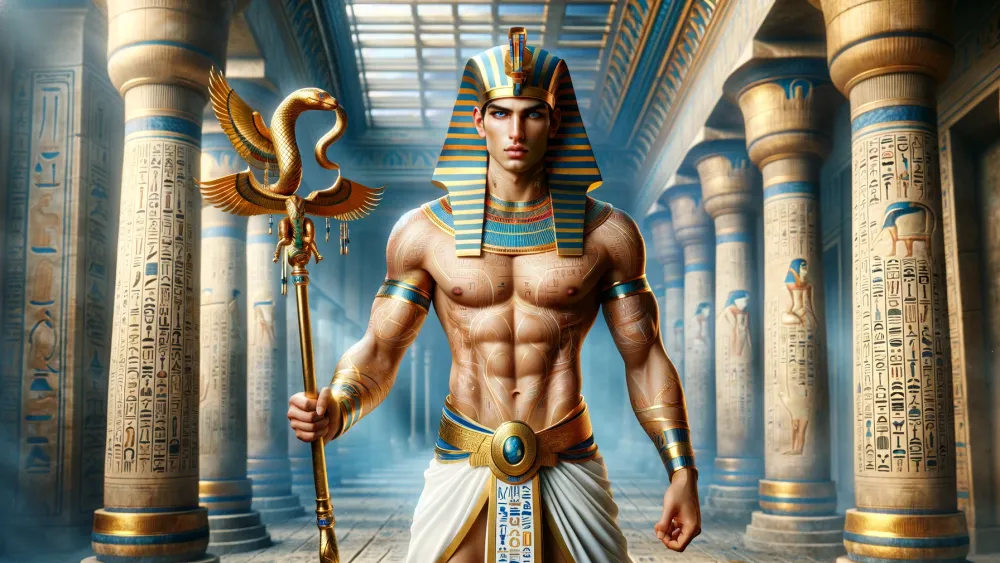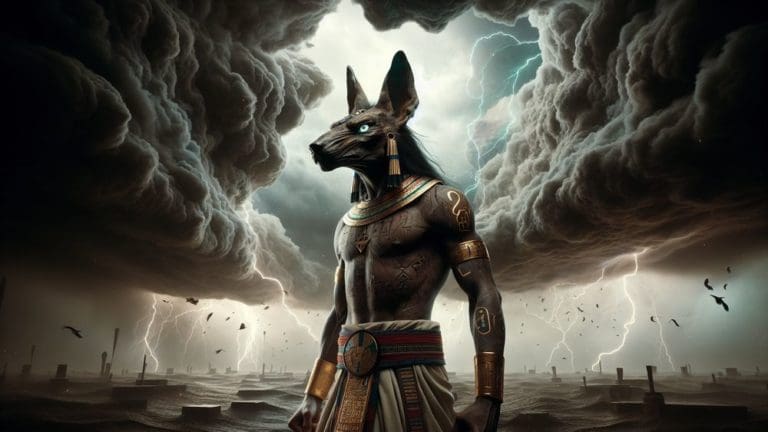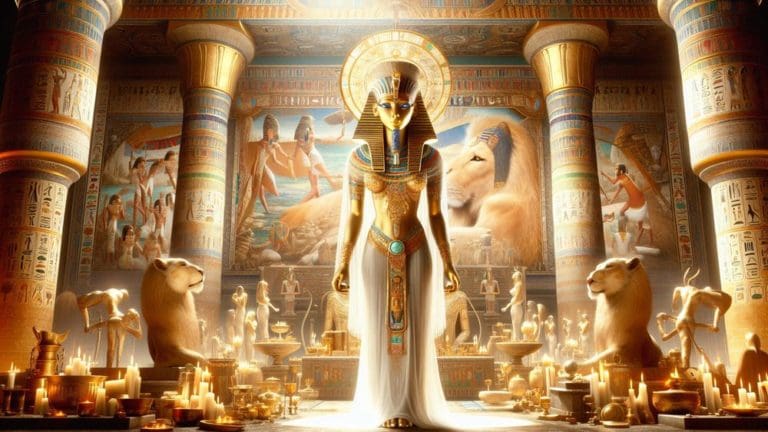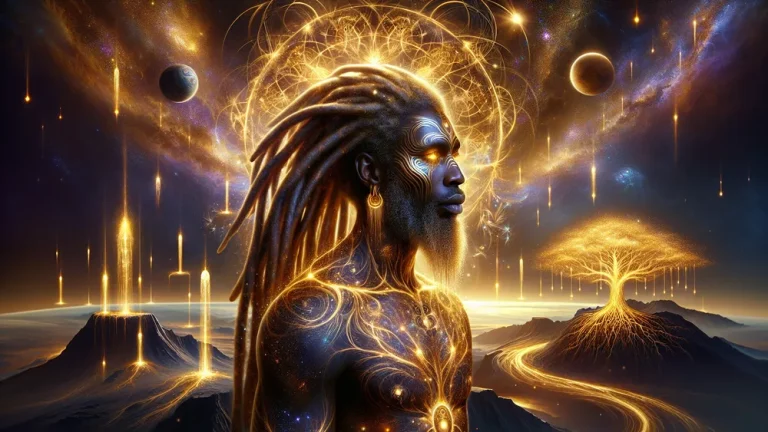Heka: Ancient Egyptian God Of Magic And Medicine
Heka, the old-school Egyptian god of magic and medicine, plays a special role in the lineup of Egyptian gods. People saw Heka as magic itself, with huge power that could change both the spirit world and real life. This blog post dives into where Heka came from, what he did, and how he still matters today.
Key Points:
- Heka is the ancient Egyptian god of magic and medicine.
- Heka’s name means to activate vital force or spirit, reflecting his role in magic and health.
- Heka played a crucial part in creation myths and was linked to the god Atum.
- In Egyptian religion, Heka was worshipped for his unique focus on magic and medicine.
- Heka’s influence extended to daily life, including protection rituals and healing practices.
- Ancient Egyptian medicine heavily relied on magic and rituals, influenced by Heka.
- Heka’s myths portray him as a powerful force in maintaining order and balance in the world.
We look at stories, how people worshipped him, and how Heka fit into everyday life. By checking out myths, rituals, and Heka’s role in society, we see how much this god shaped one of history’s coolest cultures.
The Origins of Heka
To get Heka’s story, we gotta see where he comes from and what his name means. Let’s jump into his beginnings.
The Birth of Heka
In old Egyptian stories, Heka plays a big part in creation myths. He helps the gods do their special acts. People say Heka comes from the god Atum (one of the first and most important gods). Atum makes himself and then creates other gods, including Heka, using his own power.
This link to Atum puts Heka at the start of everything, showing how important he is. Heka’s role in these stories shows his power as the god of magic, which keeps the world in order. The name “Heka” means a lot in old Egyptian talk and life. The word “Heka” splits into two parts: “He” (which means “to activate”) and “Ka” (which means the vital force or spirit).

These parts together show Heka’s job as the one who starts spiritual energy. In magic and medicine, this name shows Heka’s power to control special forces for healing and safety. The meaning of “Heka” shows his double role as a magic god and a health guardian. This name helps us see how old Egyptians thought magic and medicine worked together.
- “He” means “to activate”
- Ka” means “vital force” or “spirit
- Together, they show Heka’s role in magic and health
Heka’s name reveals his dual role as a magic god and health guardian, which demonstrates the ancient Egyptian belief in the connection between magic and medicine.
Heka’s Role in Ancient Egyptian Religion
Now, let’s check out how Heka fits into Egyptian religion. We’ll see his place among the gods and how people worship him.
Heka as a Deity
Heka holds a special place among the Egyptian gods. Unlike Ra (the sun god) and Osiris (the god of the afterlife), Heka focuses on magic and medicine. Ra controls the sun, while Osiris rules over death. Heka, however, deals with unseen forces that make magic work. This makes him unique because he bridges the gap between the physical and spiritual worlds.

His role as the god of magic and medicine sets him apart from other gods, who usually govern more specific aspects of life. People in ancient Egypt had special ways to worship Heka. They performed rituals and made offerings to gain his favor. These offerings often included food, drink, and other valuable items.
Temples and sacred spaces dedicated to Heka served as places where people could connect with him. These places often had special priests who knew how to perform the right rituals. The worship of Heka involved both public ceremonies and private prayers, showing his importance in both community and personal life.
- Offerings included food and drink
- Temples had special priests
- Worship involved public and private rituals
Heka in Daily Life
Heka plays a big part in daily life in ancient Egypt. People use magic for chores and protection. They believe Heka keeps their homes safe from bad spirits and bad luck. Families often do small rituals and say special words to call on Heka’s power. In healing, Heka is super important. Ancient Egyptian doctors (called “swnw”) use spells and charms to treat sickness.
They believe Heka guides their hands and makes their medicine work better. Heka also shows up in social and political life. Pharaohs (the rulers of Egypt) often ask for Heka’s help to make their rule strong. They believe Heka gives them special powers to govern wisely and protect their people. In legal matters, Heka is there too. Judges and officials invoke Heka’s name to ensure fairness and justice.
They believe his magic helps reveal the truth and keeps the law balanced.
- Magic for chores and protection
- Healing with spells and charms
- Pharaohs ask for Heka’s help
- Judges invoke Heka for fairness
Heka plays a crucial role in ancient Egyptian daily life for protection, healing, governance, and justice.
Heka and Medicine
Now, let’s see how Heka shapes Egyptian medicine. His influence goes beyond daily stuff and touches healing.
Heka’s Influence on Ancient Egyptian Medicine
Heka plays a big part in ancient Egyptian medicine. Doctors (called “swnw”) use spells and special words to heal people. They believe these magic words call on Heka’s power to fix illnesses. Medical texts (like the Ebers Papyrus) have many spells that doctors use. Heka also guides the training of these doctors.
Trainees learn practical skills and how to use magic in their work. This mix of medicine and magic makes their practice special. When we look at ancient Egyptian medicine and modern ones, we see some similarities and differences. Both systems aim to heal people, but their methods are different. Ancient Egyptians rely a lot on magic and rituals, while modern medicine focuses on science and technology.

However, some old practices (like herbal remedies) still get used today. The lasting impact of Heka’s influence shows up in the holistic approach of combining physical and spiritual healing.
| What They Do | Ancient Egyptian Medicine | Modern Medicine |
|---|---|---|
| Use of Magic | Common (spells and rituals) | Rare (mostly symbolic) |
| Training of Doctors | Includes magic and healing | Focuses on science |
| Herbal Remedies | Used a lot | Still in use |
| Approach to Healing | Holistic (body and spirit) | Mostly physical |
Heka in Mythology
Now, let’s see how Heka shows up in myths. His stories tell us a lot about his power and role.
Myths Involving Heka
In old Egyptian stories, Heka plays a big part. In creation myths, Heka helps the god Atum make the world. He uses his magic to shape everything. Another story shows how Heka helps other gods and people. For example, he helps Ra (the sun god) fight chaos. Heka’s magic protects and empowers the gods in their battles. The meanings behind these stories show Heka’s importance.
His actions stand for the power of magic in keeping order. By helping Atum, Heka symbolizes creation and life. When he helps Ra, it shows the fight against chaos. These stories teach that magic (and Heka) keeps the world balanced. The lessons from Heka’s myths highlight the value of magic in both divine and human realms.

- Heka helps Atum create the world.
- Heka aids Ra against chaos.
- Heka’s magic keeps order.
- Stories show the power of magic.
Heka’s magic plays a crucial role in creating and maintaining order in ancient Egyptian myths.
Pantheon of All the Egyptian Mythology Gods
For a full list of all the Egyptian gods, check out this link. It covers every major deity in Egyptian myths.
FAQs
1. Who is Heka in ancient Egyptian mythology?
Heka in ancient Egyptian mythology is the god of magic and medicine, believed to be a fundamental force in the creation and maintenance of the universe.
2. How was Heka worshipped in ancient Egypt?
Heka was worshipped in ancient Egypt through rituals and offerings made at temples and sacred spaces dedicated to him.
3. What is the significance of Heka in medicine?
The significance of Heka in medicine lies in his role as the divine embodiment of magic and healing, which ancient Egyptians believed was essential for effective medical practices.
4. Are there any modern practices influenced by Heka?
Modern practices influenced by Heka include the use of ritualistic elements in holistic and alternative medicine.







